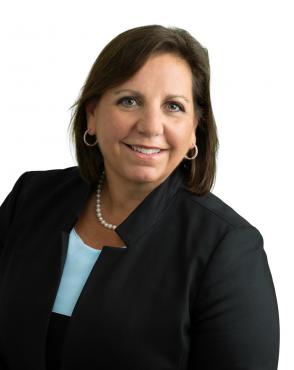Attorney Profile
Joan Orsini Ford

Areas of Practice
Contact Info
Overview
Joan focuses her practice exclusively on medical malpractice litigation involving the defense of hospitals, doctors, nurses, physicians' assistants, nursing homes, long-term care facilities and behavioral health treatment facilities. She also handles other healthcare-related issues. Throughout her career, Joan has handled in excess of 1000 medical malpractice cases, including numerous high-exposure cases involving catastrophic injuries and death in infants and adults. She has taken more than 50 major jury cases to verdict in state and federal courts with overwhelmingly favorable results.
After receiving a Bachelor of Arts in Political Science from LaSalle University in 1984, Joan attended Widener University where she earned her juris doctor in 1986. At Widener, she participated in the Philip C. Jessup International Law Moot Court Competition. Her legal education also included courses at Notre Dame School of Law in London, England, and The Dickenson Law School in Florence, Italy. Prior to joining Marshall Dennehey in 1997, Joan worked for a defense firm for nine years where she also concentrated on medical malpractice defense, primarily representing physicians.
Joan has lectured for various organizations over the course of her career, and has given presentations to nursing and medical staff at multiple hospitals on litigation related issues. In addition, she has served as an instructor in the firm's annual Advanced Trial Advocacy Mock Trial Program.
In 2021, Joan received the James P. Fox Trial Lawyer of the Year Award from the Montgomery Bar Association Trial Lawyers Section. The award recognizes not only exceptional skill as a civil litigation and trial lawyer, but also a dedication to promoting a positive image for attorneys through one’s professional demeanor, service and integrity.
Results
Defended a hospital in a case involving an alleged failure to diagnose and treat a brainstem stroke. Plaintiff was a 56-year-old man and was "locked in" as a result of the stroke. In addition to issues involving the medical care, plaintiffs were pursuing a corporate liability claim against the hospital. Plaintiff's claim for past and future medical bills and future wage loss was in excess of 17 million dollars. After a four week trial, the jury found in favor of the defense.
Defended two obstetricians in a case involving an alleged delay in the performance of a c-section resulting in severe brain damage to the infant. Future medical specials and wage loss were in excess of 145 million dollars. After a four week trial, the jury found in favor of the defendants.
Successfully defended a hospital in a wrongful death case. The plaintiff, a 50-year-old man, presented to the ER where he was diagnosed as suffering from a stroke. He received tPA and was transferred to the ICU. Plaintiff alleged there was a failure to monitor, diagnose and treat swelling in the brain and a midline shift that led to the plaintiff's death, three days later. Plaintiff's wage loss claim was in excess of five million dollars.
Defended an Institute and two psychologists in a case involving the wrongful death of a child adopted from Russia. Plaintiff alleged in the civil suit that the child sustained massive head injuries and died as a result of alleged abuse by the parents, codefendants in the civil case, and that the psychologists were negligent in failing to suspect the abuse and neglect which ultimately led to his death. The death of the child resulted in significant media exposure and Russia's suspension of adoptions to the United States. The parents were charged with the child's murder and convicted of involuntary manslaughter. Defendants settled for a confidential amount; the verdict against the parents was in excess of 14.7 million dollars.
Defended a hospital in a case involving the care and treatment rendered to a patient who, after his discharge, murdered his wife and was then murdered by his son. The story was featured in an ESPN special and Philadelphia Magazine. The case was settled with no payment by the hospital.
Entered as trial counsel for a defendant psychiatrist on the second day of trial, with no prior involvement in the case. The claim involved a murder/suicide by a man who was the patient of the psychiatrist. When trial counsel for the defendant psychiatrist became ill in court, the defense moved for a mistrial. The judge denied the request and ordered that another attorney from the firm assume the doctor's representation. After a five day trial, the case went to verdict and the jury found in favor of the defendant.
Thought Leadership
You Want How Much? The Rising Tide in Case Values, Settlement Demands and Verdicts, Marshall Dennehey Trends in Health Care and Health Law Seminar, May 9, 2024
Opioid Toxicity and Reversal: Attorney Perspective on Hospital Liability & Patient's Rights, American College of Medical Toxicology Seminar, December 11, 2017
Opioids in Civil Proceedings: Perspectives from the Defense, American College of Medical Toxicology Seminar, December 11, 2017
Trial Negotiation and Business Skills for Women Trial Attorneys, Pennsylvania Trial Lawyers Association, April 11, 2001
Treatment and Consent for Minors, Insurance Society of Philadelphia, February 21, 2001
Medical Treatment to Minors, Lehigh Valley Risk Management Society, March 1, 2000
"Long-Term Health Care Dealt Another Blow," Defense Digest, Vol. 23, No. 4, December 2017
“Nurses: Their Expanding Role as Expert Witnesses,” AgentsofAmerica.org, January 3, 2013
“Update on E-Discovery and the Electronic Medical Record,” Defense Digest, Vol. 18, No. 4, December 2012
"How to Avoid EMR Legal Pitfalls," The Family Practice News, September 14, 2012
“Nurses: Their Expanding Role as Expert Witnesses,” Defense Digest, Vol. 17, No. 1, March 2011
